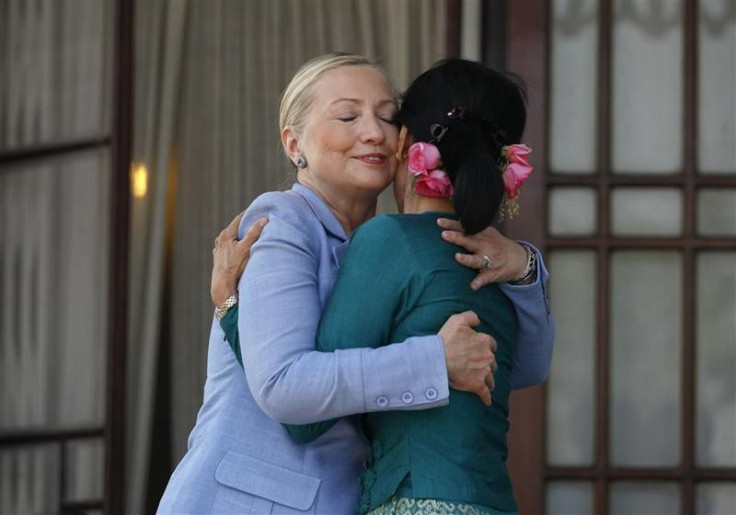Myanmar Says 302 Political Prisoners Freed in Amnesty

YANGON | Sat Jan 14, 2012 10:27am EST
(Reuters) - Myanmar's government said on Saturday 302 of the 651 detainees it freed this week were political prisoners whose release had been sought by the National League for Democracy (NLD) party of Nobel peace laureate Aung San Suu Kyi.
They were freed so they can play a part in the political process, Home Minister Lieutenant-General Ko Ko told reporters, suggesting they might be allowed to run for parliament despite their prison records, which is one of the demands of rights groups such as Human Rights Watch.
The government had not previously spelled out how many of those released on Friday under its amnesty were political prisoners, although it was clear that many prominent dissidents were among them.
Western governments welcomed the move and the United States, which has made the freeing of political prisoners a condition for lifting economic sanctions, immediately said it would begin the process of exchanging full ambassadors for the first time in 20 years.
Organizations and associations at home and abroad demanded the release of prisoners of conscience after sending in the list they had compiled, Home Minister Ko Ko told reporters.
A total of 302 were granted amnesty, after examining the list of 604 sent by the NLD, he said.
Of those on the NLD list, 107 had already been freed, the credentials of 51 could not be checked, 13 had been counted twice, one had died and two had been transferred to the Ministry of Religion Affairs, he said, without elaborating.
That left 430 names, but 128 were deemed to be common criminals and kept under detention for the sake of the rule of law, Ko Ko said, adding 13 of these had Taliban connections.
A total of 302 out of the 430 were freed so that they can take part in the national reconciliation and political process, he said.
The exact number of political prisoners who were detained under the junta that stepped aside last March is unclear.
Rights groups and the United Nations have put it at about 2,100. But Home Minister Ko Ko told U.N. Special Rapporteur Tomas Ojea Quintana in August the number was 600, or about 400 after an Oct. 12 amnesty.
Suu Kyi's NLD put the total on Friday at about 500. The party was providing help to more than 460 people it considered prisoners of conscience, Naing Naing, the party official in charge of such assistance, told Reuters, and there were a few dozen more who had not sought its help.
APPLAUSE FROM OBAMA
U.S. President Barack Obama called the release a substantial step forward in the Asian country's democratic reforms.
Much more remains to be done to meet the aspirations of the Burmese people, but the United States is committed to continuing our engagement, he said in a statement on Friday.
Those freed included Min Ko Naing and other members of the 88 Generation Students Group, which led a pro-democracy uprising in 1988 in which thousands of protesters were killed.
Also freed was Shin Gambira, a Buddhist monk who led street protests in 2007 crushed by the army. He was 27 years old when sentenced to 68 years in prison that year.
Khin Nyunt, a once-powerful chief of military intelligence, was also released.
Appointed prime minister in 2003, he ushered in a then-derided seven-point road map to democracy but was purged a year later. He had been under house arrest since.
Leaders of ethnic groups were also let out. Sai Nyunt Lwin, 60, said he and all other leaders of his former Shan Nationalities' League for Democracy (SNLD) had been freed.
Suu Kyi, a Nobel Peace Prize winner released in 2010 after years of house arrest, will run in a by-election in April.
Her party boycotted the general election in November 2010 because it felt the electoral process would not be fair. The vote resulted in a parliament dominated by serving soldiers and a party backed by the military.
(Writing by Alan Raybould; editing by Andrew Roche)
World United Nations
© Copyright Thomson Reuters {{Year}}. All rights reserved.






















